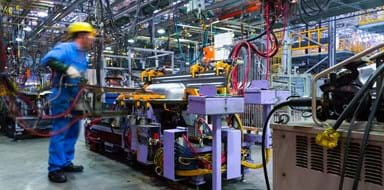
A circular manufacturing company and AI software developer have produced unique software and hardware innovations to enable 3D printing to become more scalable and sustainable.
Batch Works, a London-based manufacturer which 3D prints products using recycled materials for global brands like Timberland and M&S, partnered with Matta, an AI research spinout from the University of Cambridge, and Plus X Innovation, a workspace and innovation support provider, on a collaborative R&D project through Made Smarter Innovation’s Sustainable Factories programme.
Innovation Case Study - Matta, Batch Works & Plus XThey co-created an automated 3D printing facility which uses robotic control and AI to scale for local batch production, improving productivity and energy efficiency, and reducing waste.
Some software and hardware innovations are being patented and the project has prompted four spin out Innovate UK projects, as well as new jobs and investment opportunities.
Chris Needham, Innovation Lead for Made Smarter Innovation, said: “This project has demonstrated what can be achieved by bringing together organisations operating at the cutting edge of their fields. Matta, Batch Works and Plus X Innovation created an AI-powered automated 3D printing solution which offers manufacturers an opportunity to produce parts more efficiently and sustainably. What is more, the project has generated further innovation and an enduring collaboration to spread this solution further afield.”
The Inspiration
3D printing offers many benefits for manufacturing, including increased design freedom, streamlined processes, faster production, lower costs, improved quality, customisation, reduced material waste and transport emissions.
While growing rapidly, specifically for prototyping, it is vastly underused in manufacturing. This is because of issues with quality control, high fail rates and waste, difficulty operating processes across multiple sites, a lack of expertise and skills to scale processes, and design constraints limiting mass manufacturing applications.
The Innovation
The consortium embarked on a project to develop and test five technology solutions: an AI computer vision system to monitor and control the FDM process; monitoring hardware which can be adapted to Batch.Works’ machine; FDM machinery that allows for continuous, autonomous production; a factory management user interface; and a material marking and tracking system.
The first major package of work was to develop an AI computer vision system to monitor the fused deposition modelling (FDM) process and printing, accurately detecting errors in real time and applying automated corrections and optimisations.
Matta achieved this by developing a nozzle camera mounted system to collect real-time image data from 3D printers, label it and train the AI to detect errors and send instructions back to the printer. Through rigorous iterative development using over 4.5M collected data points (images and process parameters), Matta’s AI and associated control system was able to flag a failure to an operator using a simple alert, enable a user to specify a corrective task to happen, or actually enable the AI to cancel the job and reprint.
The second package of work was to develop a factory user interface called Factory Manager which shows live feedback of the process, as well as a host of functions including print controls, a product library, material order and maintenance.
A third project developed hardware FDM machinery that allows for continuous, autonomous production, including the print and part removal processes. Batch.Works developed a solution which lifts the steel print bed from the heated aluminium block while deploying fans to cool down the part more quickly, and then removing it from the production line.
The project also explored the development of a digital product tracking system to allow for the tracing of product life cycle. This is being developed with further IUK funding.
The partners then created a demonstrator factory at Plus X Innovation’s hub in Brighton and worked with SMEs and students to print more than 2,000 parts to test the technology workflow and further train Matta's AI models.
The Impact
The overall outcome of the project is a series of unique software and hardware innovations which are being patented, and a novel part identification method which is being further developed with IUK funding.
The automation hardware, paired with AI failure detection, allows for continuous and unmanned, overnight printing, which has sped up production cycle time and increased capacity. This also increases the productivity of operators monitoring the print process, allowing them to focus on managing more machines and/or higher value tasks.
Batch Works estimates that by utilising automated AI failure detection and parameter optimisation, it will save 40 tonnes of material over the next three years, reducing feedstock material manufacturing emissions - the largest contributor to the company’s total emissions - by 38 tonnes CO2e.
Automated part removal has reduced energy consumption for short prints by 90%. This amounts to a 25% reduction in total process energy usage for small parts production.
Batch Works estimates that by deploying the full suite of project-developed technology in its factories, it can reduce CO2e emissions by around 1,700 tonnes over the next three years.
The project prompted the company to form an R&D team with new hires and four spin out Innovate UK projects. Its success is supporting plans for a £3m funding round.
For Matta, the project helped validate the problem, build a core product ecosystem and demonstrate traction in the market. It was instrumental in Matta securing additional investment from parties in the UK, Europe and USA.
Matta is now exploring expanding its core tech, data infrastructure and AI model capabilities to integrate with other manufacturing technologies including CNC machining, robotic welding, Large Format Additive Manufacturing, powder bed, forming and food extrusion.
For Plus X Innovation, the project has improved its understanding of the competitive edge that prototyping and batch manufacturing facilities give within the workspace market.
The consortium is now pursuing a commercialisation plan for the technologies developed during the project.





